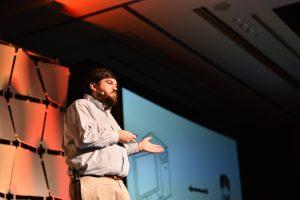
No matter how fast. No matter how powerful. No matter how many qubits can be entangled. No matter how long those qubits can remain entangled. The quantum computer industry will never reach its full potential unless people can actually use quantum computers.
Horizon Quantum Computing, a Singapore-based quantum startup, was founded with the mission of making quantum computing more people-friendly in mind, according to Joe Fitzsimons, the company’s CEO.
An industry is only as good as its tools, according to the startup’s chief, and currently, tools to help programmers and developers create quantum applications are still very rough works-in-progress.
“The thing that motivates us is the fact that quantum computing — and programming quantum computers — is still in its infancy,” said Fitzsimons. “The tools are extremely low-level at the moment and most of them are based on gate-level languages. Even if they are called from Python or another high-level language, the quantum languages themselves are pretty low-level.”

He added that developers face several problems when they program quantum computers – or try to program quantum computers, more accurately.
“One of the main issues is the often counter-intuitive logic behind quantum programming,” said Fitzsimons. “But even if you come up with a quantum algorithm, to get from what you would write in a paper to what you can actually run on hardware is a lot of work. To take a quantum idea and actually code includes a lot of time-consuming, tedious work.”
Horizon’s goal is to provide the tools that can help automate quantum programming and make it easier for programmers.
“What we’ve been trying to do is to help automate the process of creating quantum algorithms and provide enough abstraction so that the programmer doesn’t actually need to understand the underlying computational model,” said Fitzsimons, who received his doctorate in physics from Oxford.
“What we’ve been trying to do is to help automate the process of creating quantum algorithms and provide enough abstraction so that the programmer doesn’t actually need to understand the underlying computational model.”
According to Fitzsimons, the startup is attracting its first customers and is especially keen to extend the potential of quantum computing to new industries and research areas.
“We expect some of our companies to be in areas such as finance and pharma, but the real strength of our approach is that it opens up new application domains,” said Fitzsimons. “Our intention is to extend the reach of quantum algorithms to areas including computational fluid dynamics, electrodynamics simulations and computational geophysics. We expect this to open up engineering applications across a broad range of industries including aerospace, electronics and telecoms, and oil and gas.”
Building that wider net of customers, of course, is integrated with the mission of Horizon. By freeing the time – and unleashing the creativity – of programmers through tools that make quantum computing simpler, those developers will then be able to create more applications for a wider field of industries.

A Commitment to Quantum
Founders often reveal much about their commitment not so much by what they are working on, but what they are walking away from. Fitzsimons left a tenured faculty position to start Horizon. He said that his passion for creating something truly revolutionary in the quantum field made the move necessary.
“Basically, the reason I started the company was because I felt the center of gravity for quantum computing was starting to shift,” said Fitzsimons. “I look at quantum computing much like the way we look at the early days of computing. That’s really the lens I use to look at this and, for me, not all the interesting things in the computing revolution happened in universities, a lot of them happened in industry. I felt that was starting to be the case for quantum computing.”
Fitzsimons wants Horizon to be a driver of his vision for this computing revolution.
“I view quantum computing differently from many other people,” said Fitzsimons. “For example, I don’t consider quantum computing to be a technology for building coprocessors or special purpose accelerators. I consider it to be the next evolution of computing. Quantum computers should aspire to be general purpose computing devices. They shouldn’t be the equivalent of an FPGA (Field Programmable Gate Array) that you put in your Mac to render video faster. It has much more potential than that.”
Challenges
Fitzsimons is excited about the progress of quantum computing, but sees a few challenges for quantum technology.
“The reality is each platform has its own challenges and they are gradually being overcome. It’s really exciting to see the progress, but, at the same time, there’s a long way to go,” he said.
A lack of trained quantum algorithm developers is a particular challenge for Horizon, as a company, Fitzsimons added.
“For our company, one of the most difficult challenges isn’t figuring out how to do any of this stuff — we have good people on the team and we’ve been able to make good progress in terms of creating the basic quantum algorithms — but there’s a huge amount that we need to cover so that we can capture as many opportunities for quantum speed-ups as possible and are accelerating the many different types of programming structures that can arise,” he said. “To do that, we need to hire quantum algorithms people and there’s just not many of them. That’s a challenge.”
Singapore as a Quantum Hotspot
Horizon is one of several quantum computing startups that are beginning to create a quantum hotbed in Singapore. They join other research groups and university-backed institutes that are exploring practical uses for quantum technologies, said Fitzsimons, who formerly led a research group at the Centre for Quantum Technologies, which is driving much of the ecosystem creation.
“The Centre for Quantum Technologies has been here for about 12 years and it’s highly regarded as one of the top centers in the world for quantum technologies. Part of that is quantum computing, part of that is quantum communications, along with quantum sensing,” said Fitzsimons. “While the center has been around for some time, with well over a hundred people working on quantum technologies, the past two or three years there have seen a number of quantum startups starting to emerge from it as well.”
Fitzsimons said that Singapore’s success shows that, in order to create a quantum computing ecosystem a holistic approach is needed, one that combines government, academic and business communities.
“CQT is a reflection of pretty strong support from the state in that area, so there has been incredible support for quantum technologies in Singapore, not just in CQT, but also in some of the universities in that area — that has been an ecosystem-wide phenomenon,” he said.














